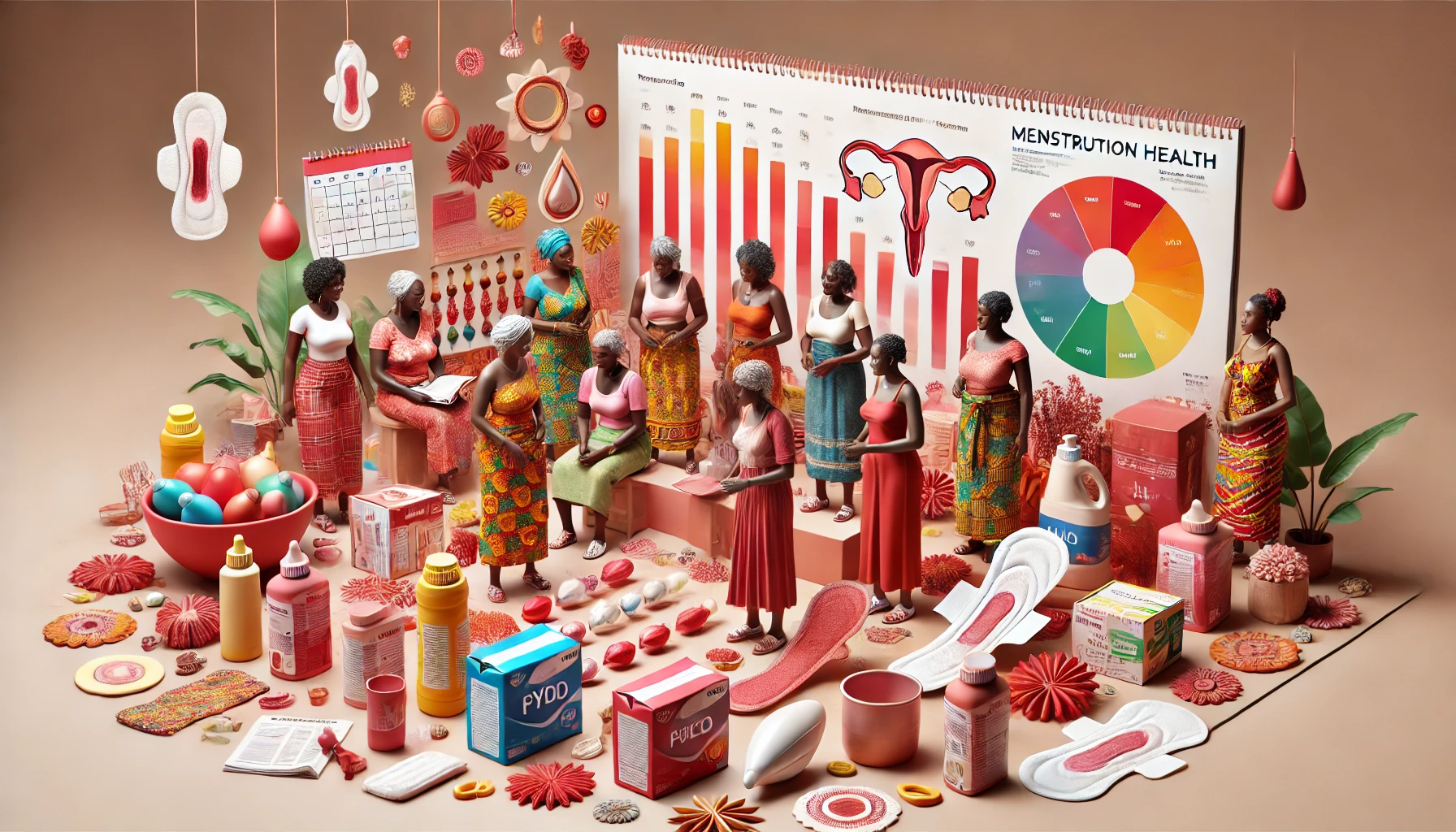
🩸 Sacred Cycles: A Ghanaian Woman’s Guide to Menstrual Health & Pride
Menstruation, often called “menses” or a “period,” is a normal and healthy part of a woman’s life. However, in many communities in Ghana, it is sometimes surrounded by myths, misconceptions, and stigma. This article aims to explain what menstruation is, why it happens, its common concerns, possible complications, and when you should seek medical help. We will also address some of the popular myths and unproven claims made by traditional healers.
Images are only illustrative; may not pass an academic critique
1. What Is Menstruation?
Definition
- Menstruation is the monthly process in which the uterus (womb) sheds its lining (blood and tissue) through the vagina if there is no pregnancy.
- It typically starts during puberty (known as menarche) in girls, usually between the ages of 9 to 16, and continues until menopause (when periods stop) around age 45 to 55.
Why Does Menstruation Occur?
- The menstrual cycle is controlled by hormones—mainly estrogen and progesterone.
- Each month, the uterus prepares itself to receive a fertilized egg by building up a thick lining.
- If the egg is not fertilized (i.e., no pregnancy occurs), the lining sheds, leading to the bleeding known as menses or a period.
Normal Menstrual Cycle
- A typical cycle ranges from 21 to 35 days; day 1 is the first day you see blood.
- Menstrual bleeding can last between 2 to 7 days.
- It is normal for your period to start and end with darker brown blood, and for the flow to be heavier on some days than others.
2. Common Myths in Ghana
While many families and communities openly discuss menstruation, others still hold on to outdated beliefs such as:
- “Menstruating women are spiritually unclean.” This is false. Menstruation is a natural, healthy process. It does not make a woman unclean or cursed.
- “Periods can be completely stopped by certain herbs or charms.” There is no scientific proof that traditional charms or herbal concoctions can safely and permanently stop periods. Women should be cautious of unproven remedies that can cause more harm than good.
- “You cannot bathe, wash your hair, or cook for your family when menstruating.” This is not true. Proper hygiene during menstruation is essential, and women can perform normal everyday tasks, including cooking.
- “Menstrual blood is poisonous.” Absolutely untrue. Menstrual blood is the same as normal blood with some tissue from the uterus lining.
By dispelling these myths, we can promote healthier attitudes toward menstruation in Ghana.
Images are only illustrative; may not pass an academic critique
3. Signs and Symptoms During Menstruation
Every woman experiences menstruation a bit differently. Common signs and symptoms include:
- Lower abdominal or pelvic cramps (dysmenorrhea)
- Back pain or waist pain
- Breast tenderness
- Mood changes, irritability, or feeling low in energy
- Headaches or migraines
- Mild nausea or dizziness
- Bloating (swollen or “puffy” feeling in the abdomen)
- Mild diarrhea or constipation in some cases
These symptoms can vary in intensity, and some women have minimal or no discomfort at all.
4. Common Concerns About Menstruation
Below are frequently asked questions and concerns around menstruation in Ghana (and globally), along with clear explanations:
- “Why can my menses be irregular?” Irregular periods can be due to stress, changes in weight, diet, exercise, hormonal imbalances, thyroid issues, polycystic ovary syndrome (PCOS), or other health conditions. It is normal for periods to be irregular for a year or two after they first begin, and also closer to menopause.
- “Which days after menses are safe for sex?” Some people use the “calendar method” (or “safe period”) to avoid pregnancy, typically counting a few days after the period as “safe.” However, no day is 100% guaranteed safe without contraception. Ovulation (the release of an egg) can sometimes occur earlier or later than expected, especially if your cycle is irregular.
- “Can menses delay for a week or two?” Yes, it can. A period can be late by a few days or even up to two weeks for reasons like stress, illness, change in routine, or traveling. If you miss a period entirely, it is wise to take a pregnancy test if you are sexually active.
- “Is it possible for my menses to come twice in a month?” Yes. If you have a shorter cycle (e.g., 21 days), it can sometimes appear as if you had two periods within the same calendar month. Very frequent or unpredictable bleeding could also be a sign of hormonal imbalance and should be checked by a healthcare professional.
- “Can my menses stop without pregnancy?” Periods can stop if you are underweight, very stressed, have hormonal or thyroid issues, or are breastfeeding. If your period stops for several months (amenorrhea), consult a healthcare provider.
- “Can menses cause fever or high blood pressure?” Mild fever-like symptoms can occasionally happen due to hormonal changes or dehydration, but a true fever (above 38°C) is not typical. High blood pressure is not generally caused by menstruation. If you have concerning symptoms (sustained high fever, severe headache, or very high blood pressure), seek medical attention promptly.
- “Can menses cause urinary tract infection (UTI) or diarrhea?” Menstruation does not directly cause UTIs, but poor hygiene or frequent use of certain products might increase the risk. Some women do experience mild diarrhea due to prostaglandin hormones during their period.
- “Why does menstrual blood sometimes look dark brown or contain clots?” The blood can appear dark brown if it stays in the uterus longer before exiting. Clots can be normal if they are small, but large or frequent clots could indicate heavy bleeding. Speak to a healthcare provider if concerned.
- “When will my period start after giving birth (delivery)?” If you are not breastfeeding exclusively, your period may return 6–8 weeks after delivery. If you are breastfeeding, it might be delayed several months because the hormone (prolactin) that helps produce breastmilk can also suppress ovulation.
- “Will I have periods after tubectomy (tubal ligation)?” Yes. Tubal ligation only blocks the fallopian tubes to prevent pregnancy. It does not stop your ovaries from producing eggs or your uterus from shedding its lining. You will continue to have monthly periods, although sometimes they may be lighter or slightly different in flow.
Images are only illustrative; may not pass an academic critique
5. Causes of Irregular or Problematic Menses
- Hormonal imbalance (e.g., thyroid disorders, PCOS)
- Stress, anxiety, or depression
- Excessive exercise or significant weight loss/gain
- Certain medications or contraceptives
- Underlying medical conditions (e.g., fibroids, endometriosis)
If you have long-term irregular periods, it is important to see a nurse, midwife, or doctor for proper evaluation.
6. Potential Complications and Warning Signs
Most women experience normal menstruation without serious complications. However, watch out for:
- Very heavy bleeding (menorrhagia) Changing sanitary pads or tampons every hour or passing large clots could indicate heavy bleeding. This can lead to anemia (low blood count).
- Seek medical help if you feel constantly tired, dizzy, or short of breath.
- Severe pain (dysmenorrhea) While mild cramps are common, extreme pain that interferes with daily activities may suggest conditions like endometriosis or fibroids. See a healthcare provider for proper treatment.
- Prolonged or continuous bleeding Bleeding that lasts more than 7 days or continues for several weeks in a row is not normal and may need medical attention.
- Complete absence of periods (amenorrhea) Missing your period for 3 months or more (and you are not pregnant, breastfeeding, or menopausal) warrants a check-up.
- Infections or foul-smelling discharge Unpleasant odour or itching could indicate an infection. Prompt evaluation is needed.
7. Addressing Unproven Traditional Claims
In some parts of Ghana, traditional healers may recommend certain herbal mixtures, spiritual rituals, or charms to “cure” or “stop” menstruation irregularities. While some natural remedies (like ginger or certain leaves) can soothe mild cramps or help with bloating, there is limited scientific evidence that they address underlying causes such as hormonal imbalances, fibroids, or infections. Always:
- Seek professional medical advice if you have chronic irregular periods, very heavy bleeding, or suspect an underlying condition.
- Avoid untested solutions that promise to permanently stop your period. Stopping menstruation without a doctor’s guidance can harm your health.
Images are only illustrative; may not pass an academic critique
8. Treatment and Management Options
Lifestyle Adjustments
- Manage stress through relaxation techniques, exercise, or counseling.
- Maintain a healthy weight (being underweight or overweight can affect the menstrual cycle).
- Stay hydrated and eat a balanced diet rich in fruits, vegetables, and iron to prevent anemia.
Medication and Pain Relief
- Over-the-counter pain relievers (e.g., ibuprofen, paracetamol) can help reduce cramps and headaches.
- Birth control pills or hormonal therapies may regulate or lighten periods—always consult a trained health provider.
Heat Therapy
- A hot water bottle or heat pad placed on the lower abdomen can relax muscles and reduce cramping.
Medical Procedures
- In cases of severe fibroids or other womb-related conditions, surgery may be necessary.
- Always consult a gynecologist or qualified healthcare professional for proper evaluation and treatment.
Healthy Hygiene Practices
- Change sanitary pads or tampons frequently to avoid infections.
- Bathe regularly.
- Wash your hands after handling used products.
9. Frequently Asked Questions (FAQs)
- Can I still exercise during my period? Yes. Gentle exercise can reduce cramping, improve mood, and boost energy.
- Can I drink tea, coffee, coconut water, or alcohol during my menses? Yes, you can, but do so in moderation. Too much caffeine or alcohol may worsen cramps or increase bloating.
- Is it safe to go to church, mosque, or other religious places during my period? Absolutely. Menstruation does not prohibit you from any religious or cultural activities unless your specific faith tradition states otherwise. Medically, there is no restriction.
- How do I calculate my cycle? Day 1 is the first day of actual bleeding. Count the days until your next period begins; that total is the length of your menstrual cycle.
- When should I seek medical help? If your period is extremely painful, very heavy, absent for 3+ months (not pregnant), or you suspect an infection, see a healthcare provider.
10. Conclusion
Menstruation (or menses) is a normal, healthy process that every woman experiences from puberty until menopause. Despite cultural myths in Ghana about spiritual or social “taboos,” it is essential to understand that menstruation is neither shameful nor unclean. Regular menstrual cycles vary in length from woman to woman, and it is common to have occasional irregularities. However, if you experience severe pain, unusually heavy bleeding, or long-term irregular cycles, seek proper medical advice.
Key Takeaways:
- Menstruation is part of a natural reproductive cycle, not a curse or spiritual punishment.
- Irregularities can happen due to stress, hormonal changes, and other factors.
- Herbal mixtures or charms with unproven claims can be risky—opt for medical check-ups when in doubt.
- Watch out for warning signs like heavy bleeding, severe pain, or prolonged absence of periods.
- Maintain a healthy lifestyle, manage stress, and consult professionals when necessary.
By spreading accurate information and dispelling myths, we can promote better menstrual health and well-being for Ghanaian women and girls. If you have any serious concerns about your menstrual cycle or experience unusual changes, please visit a local clinic or hospital and speak to a qualified health professional. You deserve quality care and support at every stage of your life.
- Fibroids and The Ghanaian Woman: Simple Steps to Protect Your Womb 👩💖🎈
- 😟 Pressure & Peace: 🌿🕊️Navigating Ghana’s Traditional & Modern Stressors
- Unsafe Abortions in Ghana: The Silent Epidemic Endangering Women 🫄
- From Bump to Baby: 🤰 A Ghanaian’s Journey Through Pregnancy 🌟👶
- Doing It Without Getting Pregnant: Contraception in Ghana 📅🛌💞

We Love to Educate for Free
But please do not self-medicate as wrong doses of even correct medications can cause serious complications like kidney failure and even death. You can talk to a LICENSED health professional (including medical doctors, specialists, physician assistants, clinical psychologists, nutritionists/dieticians, medical herbalists, etc) by downloading the Deluxe Hospital app here:










